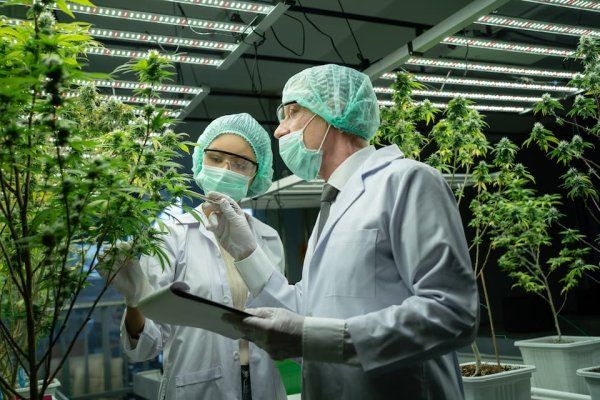Johns Hopkins University is spearheading an ambitious new research project to explore the effects of medical cannabis on patients nationwide, backed by substantial funding. This news came to light in the winter issue of the university’s Brainwise newsletter, where the institution, renowned for its groundbreaking psilocybin mushroom study, outlined its plans for this extensive cannabis research effort.
The groundbreaking study is setting out to closely examine about 10,000 medical cannabis patients across the United States to bridge the current knowledge gap between cannabis and the comprehensive validation standards applied to other medical treatments. While medical cannabis is widely used for various conditions such as pain, anxiety, and ADHD, concrete data on the long-term effectiveness of these treatments remains elusive, with only anecdotal evidence to back it up thus far.
Ryan Vandrey, a notable professor of psychiatry and behavioral sciences at Johns Hopkins University School of Medicine and one of the key figures in launching this initiative, highlighted the lack of rigorous data for cannabis when compared to other well-understood medications. "We have cannabis available as a therapeutic agent, but we're missing robust data that we possess for other drugs," he explained. The aim of this research is to grasp the health outcomes linked to therapeutic cannabis use, with the hope of discerning what products may show promise or pose risks, especially for specific groups or therapeutic uses.
The research is supported by a generous $10 million grant from the National Institute on Drug Abuse and is set to span five years. It intends to gather intricate details from patients, including their consumption methods, dosages, potential drug interactions, and the specific chemical makeup of the cannabis products they use.
Johannes Thrul, an associate professor of mental health at the Johns Hopkins Bloomberg School of Public Health working alongside Vandrey, shared insights into their approach. As patients commence their medical cannabis treatment journey, it is expected they will experiment with various products to see what best alleviates their symptoms, necessitating more frequent assessments in the initial stages of the year-long study.
One of the inherent challenges in studying cannabis lies in its vast diversity and the multitude of ways it can be consumed, which complicates the creation of standardized metrics that are typical for pharmaceutical drugs. The Johns Hopkins study is set to address this very challenge of comparing vastly different experiences and products, a task made feasible only recently due to a change in federal funding eligibility for cannabis research.
Vandrey stressed the intent to narrow down the research focus, aiming to identify areas of promise and target scientific exploration accordingly. The results of this study are anticipated to have widespread practical implications, from influencing clinical decisions and shaping legislative policies to setting standards for further clinical trials. The positive outcomes and policy changes sparked by the university's psilocybin research could serve as a precedent for the potential impact of this new cannabis study.
Working in harmony with the National Institute on Drug Abuse and the nonprofit Realm of Caring, based in Colorado, which provides resources on cannabinoid treatments, the researchers will conduct a detailed analysis of patient data over the course of a year or longer, focusing on their individual cannabis-based treatment experiences.
The groundbreaking study is setting out to closely examine about 10,000 medical cannabis patients across the United States to bridge the current knowledge gap between cannabis and the comprehensive validation standards applied to other medical treatments. While medical cannabis is widely used for various conditions such as pain, anxiety, and ADHD, concrete data on the long-term effectiveness of these treatments remains elusive, with only anecdotal evidence to back it up thus far.
Ryan Vandrey, a notable professor of psychiatry and behavioral sciences at Johns Hopkins University School of Medicine and one of the key figures in launching this initiative, highlighted the lack of rigorous data for cannabis when compared to other well-understood medications. "We have cannabis available as a therapeutic agent, but we're missing robust data that we possess for other drugs," he explained. The aim of this research is to grasp the health outcomes linked to therapeutic cannabis use, with the hope of discerning what products may show promise or pose risks, especially for specific groups or therapeutic uses.
The research is supported by a generous $10 million grant from the National Institute on Drug Abuse and is set to span five years. It intends to gather intricate details from patients, including their consumption methods, dosages, potential drug interactions, and the specific chemical makeup of the cannabis products they use.
Johannes Thrul, an associate professor of mental health at the Johns Hopkins Bloomberg School of Public Health working alongside Vandrey, shared insights into their approach. As patients commence their medical cannabis treatment journey, it is expected they will experiment with various products to see what best alleviates their symptoms, necessitating more frequent assessments in the initial stages of the year-long study.
One of the inherent challenges in studying cannabis lies in its vast diversity and the multitude of ways it can be consumed, which complicates the creation of standardized metrics that are typical for pharmaceutical drugs. The Johns Hopkins study is set to address this very challenge of comparing vastly different experiences and products, a task made feasible only recently due to a change in federal funding eligibility for cannabis research.
Vandrey stressed the intent to narrow down the research focus, aiming to identify areas of promise and target scientific exploration accordingly. The results of this study are anticipated to have widespread practical implications, from influencing clinical decisions and shaping legislative policies to setting standards for further clinical trials. The positive outcomes and policy changes sparked by the university's psilocybin research could serve as a precedent for the potential impact of this new cannabis study.
Working in harmony with the National Institute on Drug Abuse and the nonprofit Realm of Caring, based in Colorado, which provides resources on cannabinoid treatments, the researchers will conduct a detailed analysis of patient data over the course of a year or longer, focusing on their individual cannabis-based treatment experiences.




